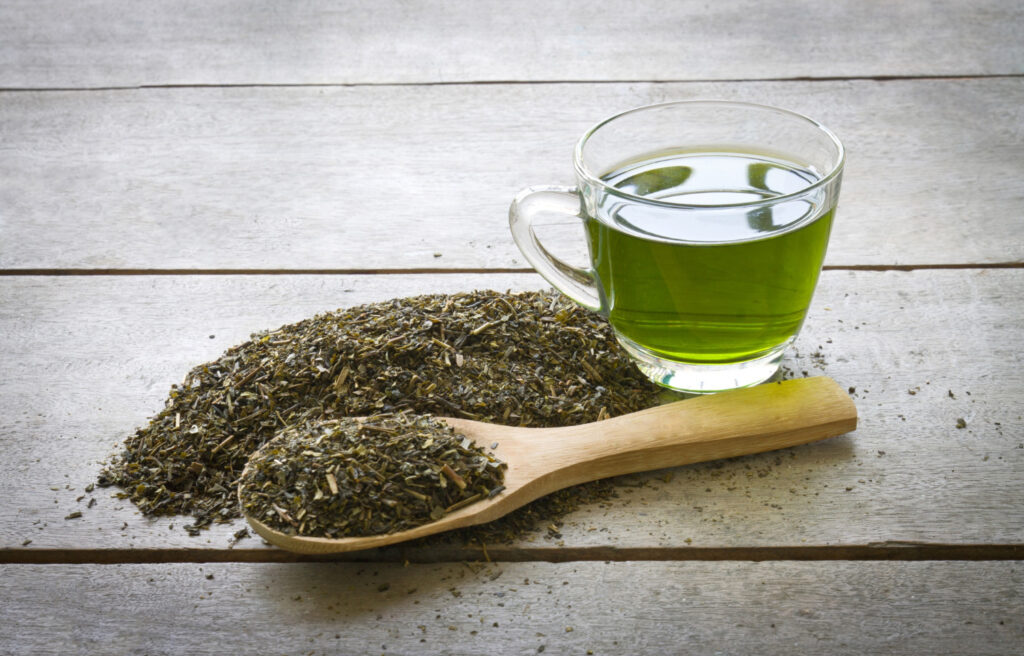
Table of Contents
Overview
Green tea, a time-honored beverage rooted in ancient Chinese tradition, is not only consumed for its soothing taste but is also celebrated for its numerous health benefits. With a variety of bioactive compounds, including powerful antioxidants, it has become popular for promoting heart health, aiding weight loss, enhancing brain function, and even supporting immune health. In this blog post, we’ll explore the science-backed benefits of green tea, share potential risks, and offer tips on how to maximize its advantages for your health.
Understanding Green Tea’s Antioxidants
Green tea is rich in polyphenols, natural compounds that have health-protective properties. Among these, catechins are the most powerful, with epigallocatechin gallate (EGCG) standing out as one of the key components responsible for green tea’s health-enhancing qualities.
- Combats Free Radicals: Catechins act as antioxidants that help neutralize harmful free radicals in the body. Free radicals can cause oxidative stress, leading to cellular damage and increasing the risk of chronic conditions such as cancer and heart disease.
- Reduces Inflammation: The anti-inflammatory properties of green tea’s polyphenols help reduce inflammation, benefiting conditions like arthritis and inflammatory bowel disease
Related: The Healthiest Breakfasts Starting Your Day Right
Green Tea and Heart Health

Several studies suggest that green tea consumption can significantly reduce the risk of cardiovascular diseases due to its ability to positively influence various heart disease risk factors.
- Improves Cholesterol Levels: Green tea has been shown to help lower levels of LDL (bad) cholesterol while increasing HDL (good) cholesterol, which can help prevent plaque buildup in the arteries.
- Helps Control Blood Pressure: Regular consumption of green tea may assist in lowering high blood pressure, a significant risk factor for heart attacks and strokes. Its flavonoids improve blood vessel function and promote vasodilation, allowing blood to flow more easily.
- Prevents Arterial Blockage: By reducing the oxidation of LDL cholesterol, green tea helps maintain clear arteries, reducing the risk of atherosclerosis
Related : Fruits with the Most Protein
Supporting Weight Loss and Metabolism
Green tea is often included in weight loss supplements, and research supports its ability to boost metabolism and aid fat loss.
- Enhances Fat Burning: The combination of catechins and caffeine in green tea can increase the rate of fat burning, especially during exercise. Studies suggest that consuming green tea extract helps the body burn more calories.
- Boosts Metabolism: Green tea’s thermogenic properties stimulate heat production, leading to an increased metabolic rate. This effect can assist with weight maintenance or loss when paired with a healthy diet and regular exercise.
- Reduces Belly Fat: Drinking green tea regularly has been linked to the reduction of abdominal fat, which is associated with a higher risk of conditions like type 2 diabetes and heart disease
Boosting Brain Function and Supporting Cognitive Health
Green tea benefits not just physical health but also cognitive function. It contains caffeine, albeit in lower amounts than coffee, and an amino acid called L-theanine, both of which contribute to improved brain function.
- Improves Mental Alertness: The moderate caffeine content in green tea can enhance focus and concentration without causing the jittery side effects often associated with coffee. L-theanine promotes relaxation and boosts the calming effects, resulting in better cognitive function and attention.
- Protects Against Neurodegenerative Diseases: The antioxidants in green tea may help protect the brain from aging-related diseases such as Alzheimer’s and Parkinson’s by reducing oxidative stress and inflammation. Catechins have shown potential in protecting neurons, potentially lowering the risk of these conditions
Related : Drinks That May Help You Sleep
Strengthening the Immune System
The health benefits of green tea extend to immune support, thanks to its bioactive compounds.
- Antimicrobial Effects: Catechins in green tea inhibit the growth of certain bacteria and viruses, making it potentially useful for preventing infections. It has also been linked to better dental health, as it can help inhibit oral bacteria that cause plaque formation.
- Promotes a Healthy Gut: The polyphenols in green tea support a balanced gut microbiome by fostering beneficial bacteria growth. A well-balanced gut contributes to stronger immune defenses, as a large portion of the body’s immune system is tied to gut health
Green Tea for Skin Health
Green tea’s antioxidant and anti-inflammatory properties make it beneficial for maintaining healthy skin, whether consumed or used topically.
- Reduces Acne Breakouts: The anti-inflammatory properties help reduce sebum production and combat bacteria, potentially minimizing acne outbreaks. Topical applications of green tea extracts have shown positive effects on acne-prone skin.
- Slows Aging Signs: Green tea’s antioxidants protect against skin damage caused by ultraviolet (UV) rays and free radicals, which accelerate the aging process. Drinking green tea or using products containing green tea extracts may help reduce the appearance of wrinkles and fine lines
Related : Veggies That Can Help You Lose Weight
Potential Cancer-Prevention Benefits
While green tea is not a guaranteed cure for cancer, research suggests it may reduce the risk of certain types due to its powerful antioxidant properties.
- Protects Cells from Damage: The catechins in green tea, especially EGCG, help prevent cellular damage, reduce inflammation, and potentially slow the growth of cancer cells. Studies indicate it may lower the risk of cancers such as breast, prostate, and colorectal cancer.
- Supports Detoxification: Green tea assists the body in eliminating harmful substances and may improve overall detoxification processes, which is essential for maintaining cellular health.
Potential Risks and Considerations
While green tea is generally safe for most people, there are some considerations to keep in mind.
- Caffeine Sensitivity: Individuals sensitive to caffeine may experience jitteriness, headaches, or sleep disturbances. If you’re caffeine-sensitive, consider opting for decaffeinated green tea.
- Iron Absorption: Drinking green tea with meals may reduce iron absorption from plant-based sources. It’s advisable to consume it between meals to minimize this effect.
- Stomach Irritation: Some people may experience stomach discomfort when drinking green tea on an empty stomach due to its tannins. Consuming it after meals can help mitigate this issue
Tips for Maximizing the Health Benefits of Green Tea
To fully enjoy the health advantages of green tea, follow these tips:
- Choose High-Quality Green Tea: Opt for organic, high-quality green tea to ensure you’re getting the best concentration of beneficial compounds without pesticide exposure.
- Brew Correctly: Use water that’s not too hot (around 160-180°F or 70-80°C) to avoid burning the tea leaves, which can result in a bitter taste. Steep for 2-3 minutes to maximize the release of beneficial compounds.
- Drink It Regularly: Consistency is key. Drinking 2-3 cups per day can offer the most health benefits.
- Pair with Healthy Foods: Combine green tea with a balanced diet rich in fruits, vegetables, and lean proteins to enhance its positive effects on weight management and overall health.
- Experiment with Different Forms: Green tea is available in various forms, including traditional loose leaves, matcha powder, and ready-to-drink bottled options. Experiment to find the form that best suits your preferences.
The Takeaway
Adding green tea to your daily routine can be a simple yet effective way to improve your health. With benefits that span heart health, weight loss, cognitive function, immune support, and skin health, this ancient beverage proves to be much more than just a soothing drink. By incorporating the tips mentioned above, you can make the most of its powerful properties and enjoy a healthier lifestyle
Related : Top Cancer-Fighting Foods You Should Add to Your Diet
Remember, while green tea can be a valuable addition to a healthy lifestyle, it’s not a substitute for a balanced diet and regular exercise. However, with its numerous health-promoting qualities, sipping on green tea each day can be a delightful step toward better well-being. Drink up and embrace the benefits that this natural elixir has to offer
Frequently Asked Questions
How many cups of green tea should I drink daily to get the health benefits?
For most people, 2-3 cups of green tea per day can provide significant health benefits. This amount balances the intake of beneficial compounds like catechins and caffeine while minimizing the risk of side effects. However, individual tolerance levels can vary, so start with one cup and gradually increase.
Can green tea help me lose weight?
Yes, green tea can aid in weight loss by boosting metabolism and enhancing fat-burning, especially when consumed regularly. The combination of caffeine and catechins helps increase calorie burning, particularly during exercise. However, it works best when paired with a balanced diet and regular physical activity.
Is it better to drink green tea hot or cold?
Both hot and cold green tea provide the same health benefits, as long as the tea is brewed correctly. The key is to avoid boiling water, as excessively high temperatures can reduce the potency of its beneficial compounds. Whether you prefer it hot or cold, choose high-quality green tea for the best results.
Can green tea be harmful if consumed in excess?
While green tea is generally safe, excessive consumption (more than 5-6 cups a day) may lead to side effects such as caffeine-related issues (jitteriness, insomnia), reduced iron absorption, or stomach irritation due to tannins. To avoid these effects, consume it in moderation and be mindful of your overall caffeine intake from other sources.











